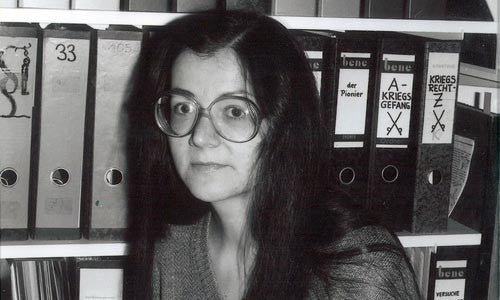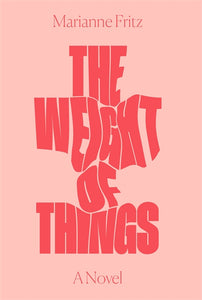A Tale Of The Violence Of Convention
An excerpt from Marianne Fritz's The Weight of Things with an introduction from translator Adrian Nathan West.

Marianne Fritz was born in 1948 in Weiz, a small industrial town in Styria, Austria’s second-largest province, not far from the Slovenian border. Reportedly – the caveat is necessary in any discussion of her biography, as first-hand testimony is rare, and Fritz gave no interviews, made few public appearances, and eschewed the kind of incidental publications from which a sense of her private character might be gleaned – reportedly her father was a laborer; if so, he likely worked in the Pichler electric plant, which remains one of the most important employers in the region. The commanding presence of the Radmannsdorf Castle and the Weizbergkirche, a stark, late-baroque church devoted to the mater dolorosa, may shed some light on the fortress or Festung concept that would determine the course of her writings; certainly the staunch Catholicism of the area is evident in the Biblical references permeating her work from its beginnings through to the unfinished final volume of her epic Naturgemäß (Naturally), which bears as a subtitle Noli me tangere (do not touch me), the words Christ uttered to Mary Magdalene when she recognized him upon his resurrection. But then, while she was still a schoolgirl, her family moved west, to Vorarlberg by Lake Constance, and perhaps none of this matters. She claimed once that her classmates had taunted her with the epithet “gypsy” as a child; it is difficult not to recollect this when reading her haunting second novel, Das Kind der Gewalt und die Sterne der Romani (The Child of Violence and the Stars of the Romani), which portrays the rape of a gypsy woman by a young Austrian landowner. Again, this is all speculation.
If one grasps at these straws, despite the author’s own admonition that “the work should stand on its own, the author should remain anonymous,” it is because her oeuvre, in its scale, scope, and originality, seems to have few precedents, and little in common with the figures normally called to mind when one thinks of the term “experimental fiction.” At age thirty, she made a promising debut with her short novel Die Schwerkraft der Verhältnisse, which I have translated as The Weight of Things. Two years later came the aforementioned second novel, which sold poorly and received few reviews. Its concern with undermining the foundation myths of Austrian identity was consonant, in some ways, with the aims of Fritz’s contemporaries Gerhard Roth and Franz Innerhofer, but its unusual structure and language, while far from outlandish, proved a stumbling block for critics. Five years later, she published Dessen Sprache du nicht verstehst (Whose language you don’t understand). The title is a reference to Deuteronomy 28:
The LORD shall bring a nation against thee from far, from the end of the earth, as swift as the eagle flieth; a nation whose tongue thou shalt not understand; A nation of fierce countenance, which shall not regard the person of the old, nor shew favour to the young: And he shall eat the fruit of thy cattle, and the fruit of thy land, until thou be destroyed…
A 3,400-page saga of war, of rebellion and subjection, digressive and enigmatic, it was a step too far for her first publisher, S. Fischer Verlag, who turned it down despite the enthusiasm of her editor. She soon moved on to Suhrkamp, where Siegfried Unseld, a visionary figure whose focus on writers, rather than books, made him the stuff of legends, took her on as a house author. There were faint voices of extravagant praise amid more generalized bafflement: in an amusing account of his failure to finish the book, one critic complained, not entirely wrongly, of Fritz’s writing as an assault on the reader. In 1996 and 1998, Naturgemäß I and II appeared, each in a set of five volumes. Their unusual format – A4 typescripts with diagrams, drawings, and text running over the pages in all directions – makes conventional length calculations impossible, but it is likely that – excluding vanity projects – they make up the longest novel ever written. Fritz was at work on Naturgemäß III, available online at mariannefritz.at, when she died in 2007.
Difficult writers are rich fodder for academics, and Fritz, while not widely known, has had her share of scholarly attention. Her work has been analyzed with reference to traumatology and l’écriture féminine, as a radical response to Musil’s Man Without Qualities, as history written from below. For some, such interpretations will prove an enhancement to reading, but they run the danger of standing in for the text itself. Friedhelm Rathjen, Melville and Joyce’s translator into German, proposes a stratigraphic analysis that strikes me as a fruitful entrée into the connections between Fritz’s early and late work (one might note here the similarity between the German terms stratified – geshichtet – and history – Geschichte). The fortress that would give its name to Fritz’s project as a whole makes its first appearance in The Weight of Things as the asylum where the protagonist, Berta, is interned after murdering her children and attempting suicide. It shows up as the final stop for various characters in Dessen Sprache, and is transmuted, in Naturgemäß, into the Przemyśl Fortress, a flashpoint for fighting between Russia and Austria-Hungary during the Crimean War and World War I. Like Christian churches built over the razed foundations of pagan temples, the incidents, characters, and settings of Fritz’s novels lie one atop the other, but with the added complexity that here, neither time nor identity are fixed, so that a given person may have several names and vanish and reappear across epochs.
The Weight of Things, then, would form the bedrock of Fritz’s fortress, the most primitive layer, also the most petrified. Through polysemy, portmanteau words, the violation of grammar and linearity, her characters in the later novels manage to elude the paths destiny has chosen for them; in The Weight of Things, they are doomed from the beginning, bound in the prisons of convention and stereotyped language, and the closest simulacrum to freedom is madness. The Weight of Things is above all a tale of the violence of convention: of the way the contradictory imperatives of postwar Austrian society drive a single family inevitably to their doom.
When Wilhelmine caught sight of Berta, she went up to her with arms wide: “Berta! You poor thing! How are you though? Just look at you! This hair! Who gave you this outrageous haircut?” She accosted Berta’s left cheek with a kiss, her right with another, examined her from all sides, took a look around the room, and declared with satisfaction, “The bed linens are clean and everything seems to be in its place.”
She ran a finger lightly over Berta’s nightstand and announced, thoroughly contented, “Indeed. No dust. That’s what I call order. See, Berta. Things have actually turned out quite well for you. They take care of you here. Here everything is in order, everything has its place.”
She pawed Berta’s cheek and then offered good-naturedly, “Isn’t that right, you poor little thing? It’s not so bad as all that. What do you say, my little dear?”
Berta giggled and dropped her head, ashamed. Hardly had the door opened when Wilhelm jumped up, jerking back his hand and sending the roses flying from Berta’s lap onto the floor. Desperately, he racked his brains for a clever turn of phrase, something to make light of the situation. He soon found it, or so he thought, for as soon as he spoke it aloud, he immediately regretted opening his mouth:
“You know our Wilhelmine, Berta! She sweeps in, tosses everything into disarray, and then, miracle of miracles (!), God looks down and all is squeaky clean.”
Wilhelmine’s eyes were on the Madonna. She sat down by Berta on the bed, ran her hand over Berta’s hair, reached nonchalantly for Berta’s necklace, and in a tone so gentle it made the sweat bead up on Wilhelm’s forehead, she cooed, “Berta! My child! My little disaster! You’re still holding onto that Madonna trinket!” She smiled, stared into Berta’s eyes, and Berta giggled, more ashamed than ever, before lowering her eyes to the floor.
Wilhelmine rested her right hand on Berta’s lap and left it there a long while, till Berta’s fluttering eyelids showed she had seen what there was to see on Wilhelmine’s ring finger. Berta reached up, let her arm drop, said, “So. So,” and set to twiddling her thumbs. Her own ring was locked up in the fortress depository.
Wilhelmine rolled the Madonna trinket back and forth between her fingers. When Wilhelm nudged her, she responded with an obstinate shrug. He wiped his forehead with the large white kerchief Wilhelmine had embroidered with a W and an S, then tugged at his necktie, opened the top button of his white shirt, and pushed the cloth down into his collar, mopping up the sweat on his neck.
“Wilhelmine. We have to go.”
Berta looked up, her eyes met Wilhelm’s, and in that moment he longed for the floor to open up and swallow him and Wilhelmine whole.
The above is excerpted from The Weight of Things by Marianne Fritz, translated by Adrian Nathan West.
Adrian Nathan West is the author of The Aesthetics of Degradation and translator of a dozen books, including Marianne Fritz’s The Weight of Things, Pere Gimferrer’s Fortuny, and Josef Winkler’s Graveyard of Bitter Oranges. His writing appears regularly in the Los Angeles Review of Books, the Times Literary Supplement, and the Literary Review.
[book-strip index="1" style="buy"]
